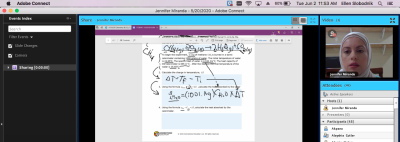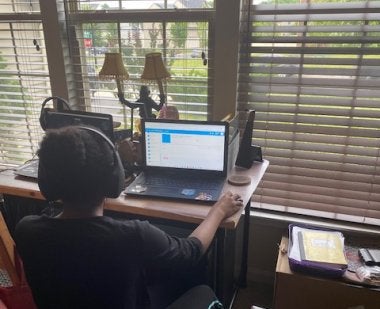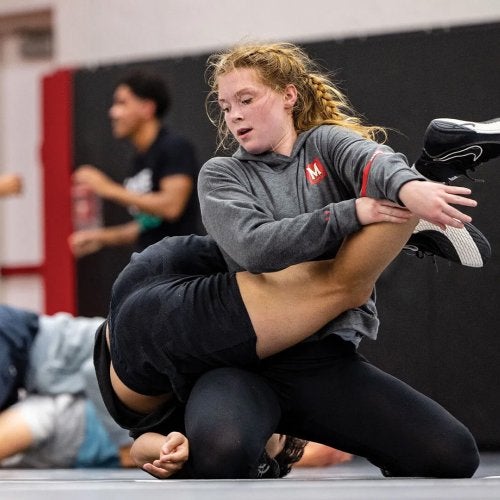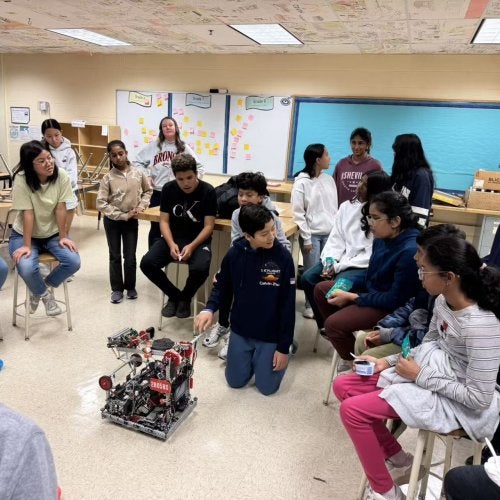

College Park Academy Offers Lessons in Online Learning

When the pandemic hit the U.S. this spring, K-12 school life was upended. Yet, the College Park Academy, a public charter school that provides a blended learning environment to middle and high school students in Prince George’s County, was well-positioned to transition to a completely virtual environment.
“College Park Academy uses a blended learning model,” said Duane Arbogast, executive director of CPA. “All the content is online, all the interactive videos are online, and children access the content online, but typically, the majority of classes are taught by live teachers in a classroom, with about one-third of courses provided by remote teachers.”
Following the emergence of COVID-19, all instruction at CPA, which launched in 2013 with input and collaboration from the University of Maryland, became virtual.
“Other schools are crash-learning about online teaching, but at CPA, the school was designed so that you didn’t have to physically come to class to learn,” said Senator Jim Rosapepe (D, College Park) and a CPA Board member. “Our model is replicable and could be helpful for other K-12 schools who have moved into remote learning.”
When the school launched less than a decade ago, the innovative design was led by then-UMD Dean College of Education Dean Donna Wiseman, along with the College Park City/University Partnership, the Prince George’s County Public School system, and Pearsons’ Connections Education. Today, the school’s Board includes UMD deans, faculty, and staff, as well as local city leaders.
By any measure, CPA has been a remarkable success. With more than 1,600 applicants for 200 spots, the school has some of the highest test scores in the state of Maryland, and the opportunity for upper-level students to take courses for free at UMD.
“CPA demonstrates that blended and online learning approaches can lead to excellent student outcomes. A critical part of that model is preparing teachers well,” said UMD College of Education Dean Jennifer King Rice.
CPA and COE leaders offer the following recommendations for schools to be successful in online teaching:
Make content interactive: “It makes a lot of sense to move content into a format that’s interactive. The day of PDFs of curriculum just doesn’t make sense anymore,” said Arbogast.
Online platforms matter: “It’s important to utilize an online platform that has significant security, but also allows for interaction. The idea of engaging with teachers and adults via email or the platform is very important,” Arbogast added.
Establish online protocols: “Online learning demands a new set of norms and practices. How students and teachers engage in an online environment is different than a classroom environment. In addition, distance learning requires new ways of pacing the work and ensuring that time is allotted to learning,” Arbogast said.
Train teachers: “We have to train teachers to teach online. That’s central to success,” said Dean Rice.
Ensure students have technology: Prior to the pandemic, CPA students brought their own devices to school, had broadband access at home, and were able to access a low-cost leasing or borrowing technology program, leaving them well-prepared for learning at home.
Employ instructional coaches: “Success coaches monitor students’ work in the virtual environment, providing support in real time, and contacting parents in real-time,” Sen. Rosapepe said. “They’re the flesh-and-blood umbilical cord between kids and parents at CPA.”
Many of the strategies CPA used to promote student engagement and achievement pre-COVID-19 are applicable now.
“For instance, creating assignments that allowed a student to choose the product in which they would display their learning is great now, because students have access to different resources at home—one student might create a skit with their siblings, while another might write a story,” said Christopher Irwin, an instructional lead teacher or ‘coach’ at CPA.
CPA leaders recognize that access to high-speed internet could be more difficult in some areas of Maryland, like the Eastern Shore and western region. Also, some students gravitate toward online learning, while others struggle with the approach, they say.
Yet, the blended learning model of CPA is able to serve a diverse student body and could offer guidance for schools and teacher training models.
“CPA and the UMD College of Education are well positioned to support professional development opportunities for teachers across the state in distance learning,” said Dean Rice. “Preparing teachers to adopt innovative methods and new strategies for delivering content remotely will be essential for successful implementation of school system plans in the fall.”
Drawing on their expertise in blended and online education, CPA and the College of Education will offer meaningful teacher-directed professional development opportunities through workshops and coaching networks that address remote teaching and learning, during as well as after the pandemic, Dean Rice said.
In addition to the professional development, CPA is proposing support in developing distance learning for districts across the state.
The partnership between UMD and CPA reflects a commitment to innovative and effective education practices.
[Photos courtesy College Park Academy]


